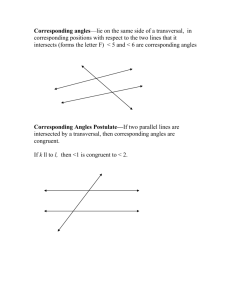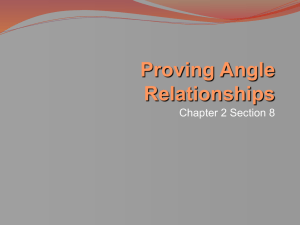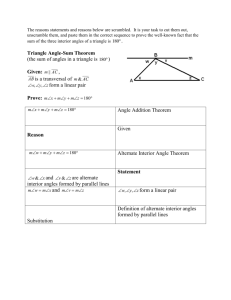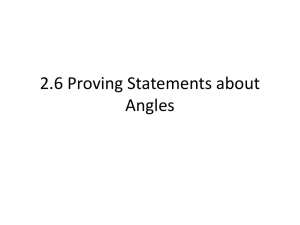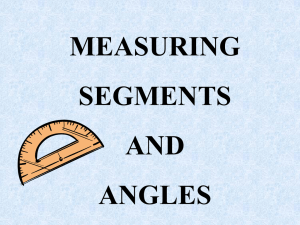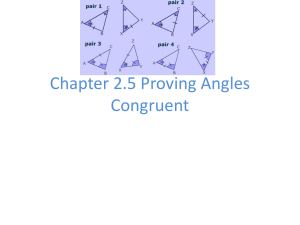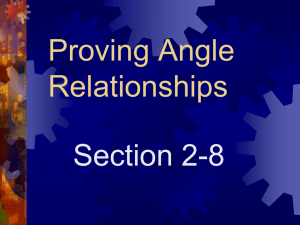Geometry Fall 2014 Lesson 017 _Using postulates and theorems to
advertisement
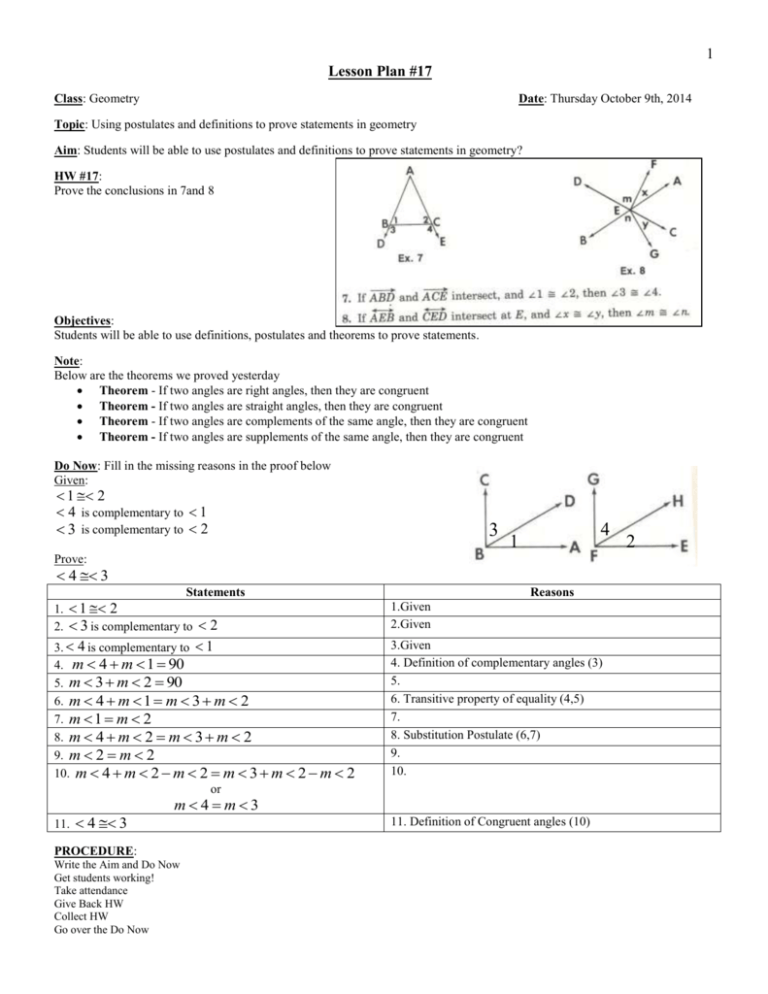
1 Lesson Plan #17 Class: Geometry Date: Thursday October 9th, 2014 Topic: Using postulates and definitions to prove statements in geometry Aim: Students will be able to use postulates and definitions to prove statements in geometry? HW #17: Prove the conclusions in 7and 8 Objectives: Students will be able to use definitions, postulates and theorems to prove statements. Note: Below are the theorems we proved yesterday Theorem - If two angles are right angles, then they are congruent Theorem - If two angles are straight angles, then they are congruent Theorem - If two angles are complements of the same angle, then they are congruent Theorem - If two angles are supplements of the same angle, then they are congruent Do Now: Fill in the missing reasons in the proof below Given: 1 2 4 is complementary to 1 3 is complementary to 2 3 4 1 Prove: 4 3 Statements Reasons 1. 1 2 2. 3 is complementary to 2 1.Given 2.Given 3. 4 is complementary to 1 4. m 4 m 1 90 5. m 3 m 2 90 6. m 4 m 1 m 3 m 2 7. m 1 m 2 8. m 4 m 2 m 3 m 2 9. m 2 m 2 10. m 4 m 2 m 2 m 3 m 2 m 2 or 3.Given 4. Definition of complementary angles (3) 5. 6. Transitive property of equality (4,5) 7. 8. Substitution Postulate (6,7) 9. 10. 11. 4 3 m4m3 PROCEDURE: Write the Aim and Do Now Get students working! Take attendance Give Back HW Collect HW Go over the Do Now 11. Definition of Congruent angles (10) 2 2 What theorem was just proven in the Do Now? A similar proof can be provided for the following theorem: If two angles are congruent, then their supplements are congruent. Recall the definition of a linear pair: A linear pair of angles are two adjacent angles whose sum is a straight angle. Assignment #1: Fill in the missing reason in the proof 1 2 Given: <1 and <2 form a linear pair Prove: 1 is supplementary to angle 2 Statements 1. 1 and 2 form a linear pair 2. 3. m 1 m 2 180 4. <1 is supplementary to angle <2 Reasons 1. Given 2. Definition of a linear pair 3. 4. Definition of supplementary angles Theorem: If two angles form a linear pair, they are supplementary Assignment #2: Fill in the missing reason in the proof B Given: C E Prove: D A Statements 1. 2. and intersect at E 3. <BEC is the supplement of <AEC; <AED is the supplement of <AEC 4. <BEC <AED Reasons 1. Given 2. Definition vertical angles 3. If two angles form a linear pair, they are supplementary 4. Theorem – If two angles are vertical angles, then they are congruent. Assignment #3: Complete the proof below Statements ect Reasons 1. CE bisects ADB 1. 2. ADE BDE 2. 3. FDB and 3. CDE intersect. 4. BDE and FDC are vertical angles 5. BDE FDC 4. 6. 6. Transitive Property of congruence (2,5) 5. 3 Sample Proof: Statements 1. ABC 2. r s 3. m r m s 4. BE bisects CBD 5. BF bisects CBG 6. m CBE m x m r 180 7. m CBF m y m s 180 8. m CBE m x m r m CBF m y m s 9. m r m s 10. m CBE m x m s m CBF m y m s 11. m s m s 12. m CBE m x m CBF m y 13. CBE x 14. m CBE m x 15. CBF y 16. m CBF m y 17. m x m x m y m y 2m x 2m y or 18. m x m y 19. x y Chapter Review: Reasons 1. Given 2. Given 3. Definition of congruent angles (2) 4. Given 5. Given 6. Postulate – The sum of the degree measures of all the angles on one side of a given line whose common vertex is a given point on the line is 180 (1) 7. Same as reason 6 (1) 8. Transitive Property of Equality (6, 7) 9. Definition of congruent angles (2) 10. Substitution Postulate (8,9) 11. Reflexive Property of Equality 12. Subtraction Postulate (10,11) 13. Definition of an angle bisector (4) 14. Definition of congruent angles (13) 15. Definition of an angle bisector (5) 16. Definition of congruent angles 17. Substitution Postulate (12, 14, 16) 18. Division Postulate (17) 19. Definition of congruent angles (18) 4
